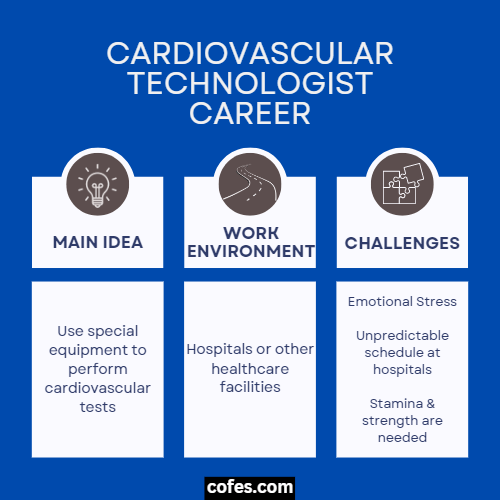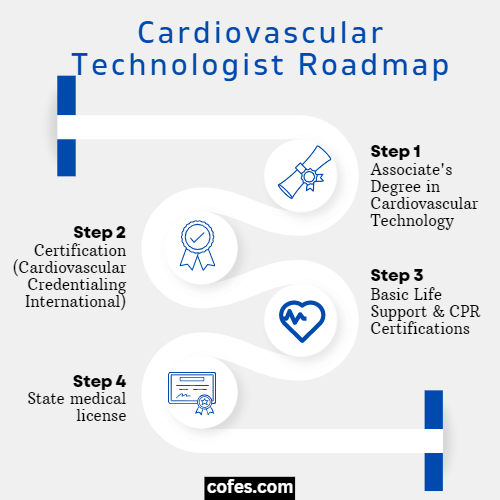What does it take to become a Cardiovascular Technologist?
Either you are looking into options in the medical field, or you are on your way to being a cardiovascular technologist and need some guidance on what it takes to be one.
You may even have a yearning to help people.
This article will go into just about everything you need to know, from what type of degree you need to what you can expect during your interview.
Also, this full guide will share information for HR managers that need to hire a Cardiovascular Technologist.
Read on to strengthen your understanding of this exciting role!
Cardiovascular Technologist Job Information
| Official Job Title | Cardiovascular Technologist |
| Average Salary | $76,200* |
| Stress Level | Medium-High |
| Work/ Life | Medium |
| Job Satisfaction | Medium |
| Career Advancement | Above Average |
*Source: Cardiovascular Technologist (Catheterization Lab) Salary | Salary.com
Cardiovascular Technologist Job Description
What is a Cardiovascular Technologist?
A cardiovascular technologist is someone who deals with the heart.
They can be the ones who put in stents and pacemakers and things of that nature.
They can treat and diagnose people with anything dealing with the heart and blood vessels.
They know to operate the technology that goes along with the job.
That way, no errors could be made during testing and diagnosis.
What Does a Cardiovascular Technologist Do on a Daily Basis?
They would assist the physician in the diagnosis process and perform procedures to save someone if they have a heart attack.
They could be putting in stents, pacemakers, and defibrillators.
They are the ones who would diagnose someone with heart disease.
Responsibilities, Duties, & Roles of a Cardiovascular Technologist
As a cardiovascular technologist, you have responsibilities and duties to assist the physician and help diagnose the patient after running some tests on them that need to be done.
You will aid the physician when needed and communicate proficiently with them so no problems arise.

Salary of a Cardiovascular Technologist
- Average Salary is around $76,200
- Starting Salary is around $59,388
- Senior Salary is around $96,833
The salary can vary depending on your state, but this is primarily the US salary for 2021.
How to Become a Cardiovascular Technologist?
The Entry Level: Certification, Training, & Degree
In certain states in the US, you need to have a certificate to practice as a cardiovascular technologist.
You need to have formal education as well.
You can get a diploma at a hospital, clinic, or university.
The degree can go from an associate’s to a bachelor’s degree.
They can specialize in treating adults and children.
You need clinic work as it is crucial to your education.
Nothing can replace hands-on experience with patients.
Other Skill Sets, Requirements, & Qualifications
There are some requirements that you need to have when being a cardiovascular technologist.
They are all health, security, and physically related.
First, you would need to have medical forms for Hepatitis B, DT, and MMR vaccines.
An annual physical and some more vaccinations include an up-to-date flu shot and chickenpox vaccination.
Like most jobs, you need a background check and a drug screening.
The drug screening would be at random times, more than likely, and there would probably be a background check every now and again, depending on the place.
Now on to the physical side of being a cardiovascular technologist.
You need to be capable of lifting more than 20 pounds, bending, stooping, kneeling, pushing, pulling, standing for extended amounts of time, seeing clearly, and being able to tell the difference in colors.
How Long Does It Take to Become a Cardiovascular Technologist?
You can get licensed or certified in less than a year for each.
When you get a degree, the time it takes to become a cardiovascular technologist varies based on your state’s requirements.
Is it Hard to Become a Cardiovascular Technologist?
It is hard in a way that you have so many requirements that you have to meet.
Especially when you need a background check and you have past records under your belt that are hard to get rid of.
Cardiovascular Technologist Career Paths
The Cardiovascular Technologist Roadmap
Becoming a cardiovascular technologist may seem long, but it is ultimately worth it.
The roadmap consists of getting certificates and licenses, getting a degree, and taking care of the requirements needed to be able to be a cardiovascular technologist.

Projections for Growth in Cardiovascular Technologist Jobs
The projection for growth in cardiovascular technologists is 10% through 2031, according to the U.S. Bureau of Labor Statistics.
In Summary: Is Cardiovascular Technologist a Good Career?
This will be a promising career if you want to help and potentially save people.
You do need to keep in mind to keep your mental health in check, especially when you must inevitably deal with a patient that passes away.
This job will affect you in ways that it is good to have a counselor or a therapist to help you deal with things.
Working Conditions of a Cardiovascular Technologist
Can a Cardiovascular Technologist Work Remotely from Home?
Cardiovascular technologists can’t work remotely as they can’t work with patients in real-time nor do the duties they need to do in the hospital or clinic.
Being a cardiovascular technologist involves being on-site, and going remote wouldn’t be possible.
How Many Hours Does a Cardiovascular Technologist Work?
A cardiovascular technologist usually works for forty hours or more, depending on daily occurrences.
Can a Cardiovascular Technologist Work Part-time?
The only way cardiovascular technologists can work part-time is if they work in a clinic that isn’t too busy.
This job is mostly a full-time job due to what it entails.
What are the Average Vacation Days of a Cardiovascular Technologist?
This depends on the place you are hired at. It could be a week or up to three weeks a year, depending on the employer and how much you have already worked at the place.
Alternative Careers & Similar Jobs to a Cardiovascular Technologist
- Radiologic Technologist
- Dental Hygienist
- Medical Office Administrator
- Medical Laboratory Technician
- Medical Researcher
- Forensic Science Technician
- Physical Therapy Assistant
- Phlebotomist
- Pharmacy Assistant
- Chemical Dependency Counselor Assistant
Resume Tips for a Cardiovascular Technologist
By now, you are well on your way to starting a resume, but you may not know where to start.
Well, here are some tips for you to have a chance to stand out amongst others.
You need to be sure that what you put in your resume is clear and concise with the job.
You need to list all the skills you have to do the job and your experience level.
Be sure to put your education level, as this is important to the place you are applying to.
Let the employer know that you have researched the place by describing why you are suitable for the position at the site you are applying to.
Cardiovascular Technologist Interview Questions
Q1: What made you want to become a cardiovascular technologist?
Why it works: This question will teach the interviewer why you wanted to become a cardiovascular technologist.
If you are in it just for the money, you are probably not a good fit as a cardiovascular technologist.
Q2: What skills do you have that would help you in this job?
Why it works: This question, even though you have listed them on a resume, is so the interviewer would get a feel of what skills you have and double-check to make sure you can do the job.
Q3: How much compassion do you have?
Why it works: This lets the interviewer see how well you can deal with patients and their loved ones kindly, no matter what they are going through.
You will face a lot, and you need to have compassion and no judgment toward what the patient and others are going through.
Q4: Do you have a lot of patience?
Why it works: This question will be important in the long run. This career does require patience as it does not go fast.
Jobs Related to Cardiovascular Technologist
- Medical or Clinical Laboratory Technician
- Nuclear Medicine Technologist
- Radiologic Technologist
- MRI Technologist
For HR Manager: Tips for Hiring a Cardiovascular Technologist
Key Characteristics to Look for in a Cardiovascular Technologist
Some key characteristics important for a cardiovascular technologist are compassion, patience, a calm temperament, and being unjudgmental.
Minimum Level of Education & Experience
As an HR manager, you need to ensure that they have a certificate and some formal education that would go towards them being a cardiovascular technologist.
This is important that you check because you don’t want someone that wouldn’t have the necessary education to be one.
You would be held liable for not checking and making sure.
Resources:
- Cardiovascular Technologist or Technician | explorehealthcareers.org
- Cardiovascular Technologist – Career Rankings, Salary, Reviews, and Advice | US News Best Jobs
- How to Become a Cardiovascular Technologist – Steps & Time Required (medicaltechnologyschools.com)
- Cardiovascular Technologist Schools & Programs (medicaltechnologyschools.com)
- Cardiovascular Technologist | Job Description & Responsibilities (study.com)
- Cardiovascular Technologist (Catheterization Lab) Salary | Salary.com
